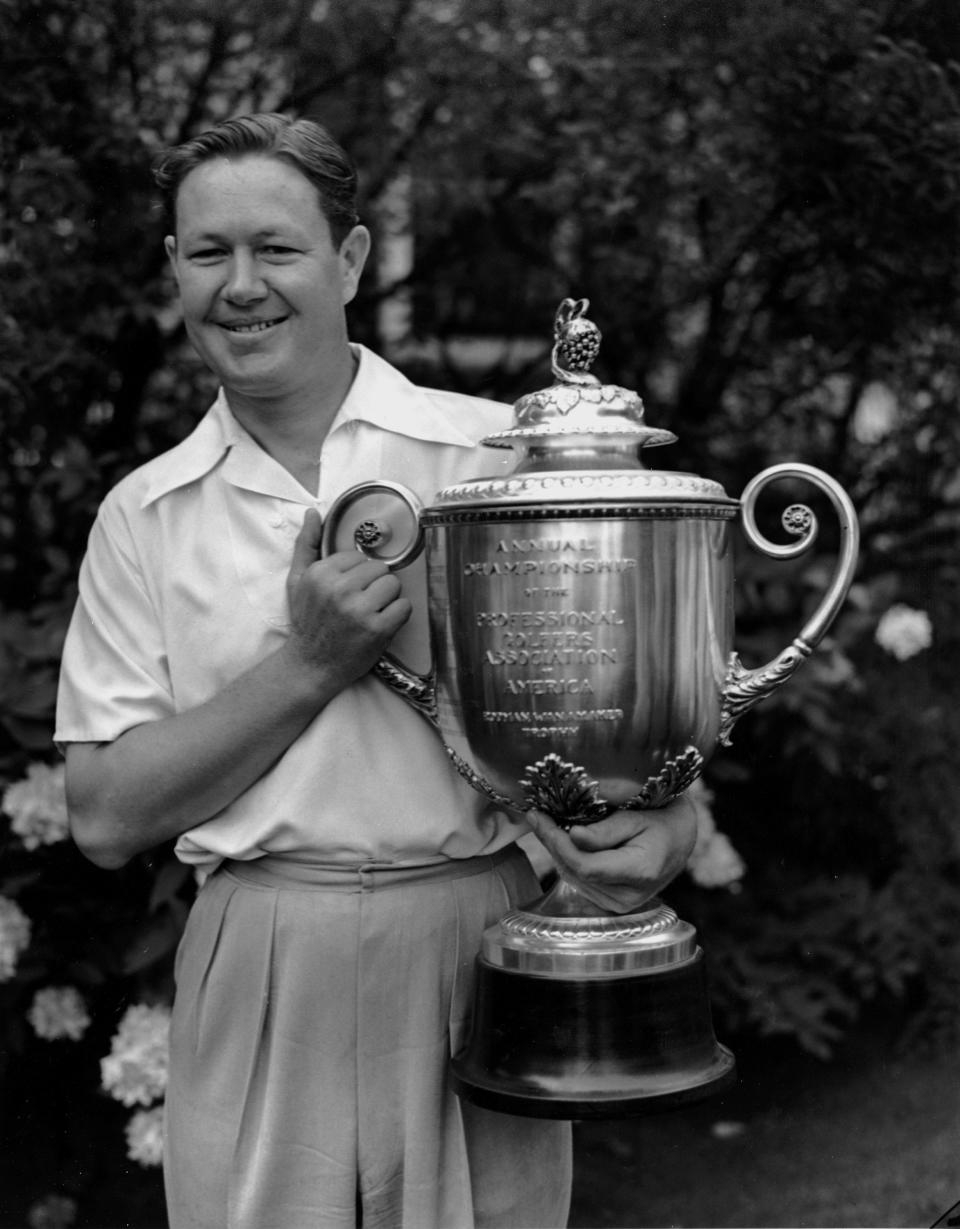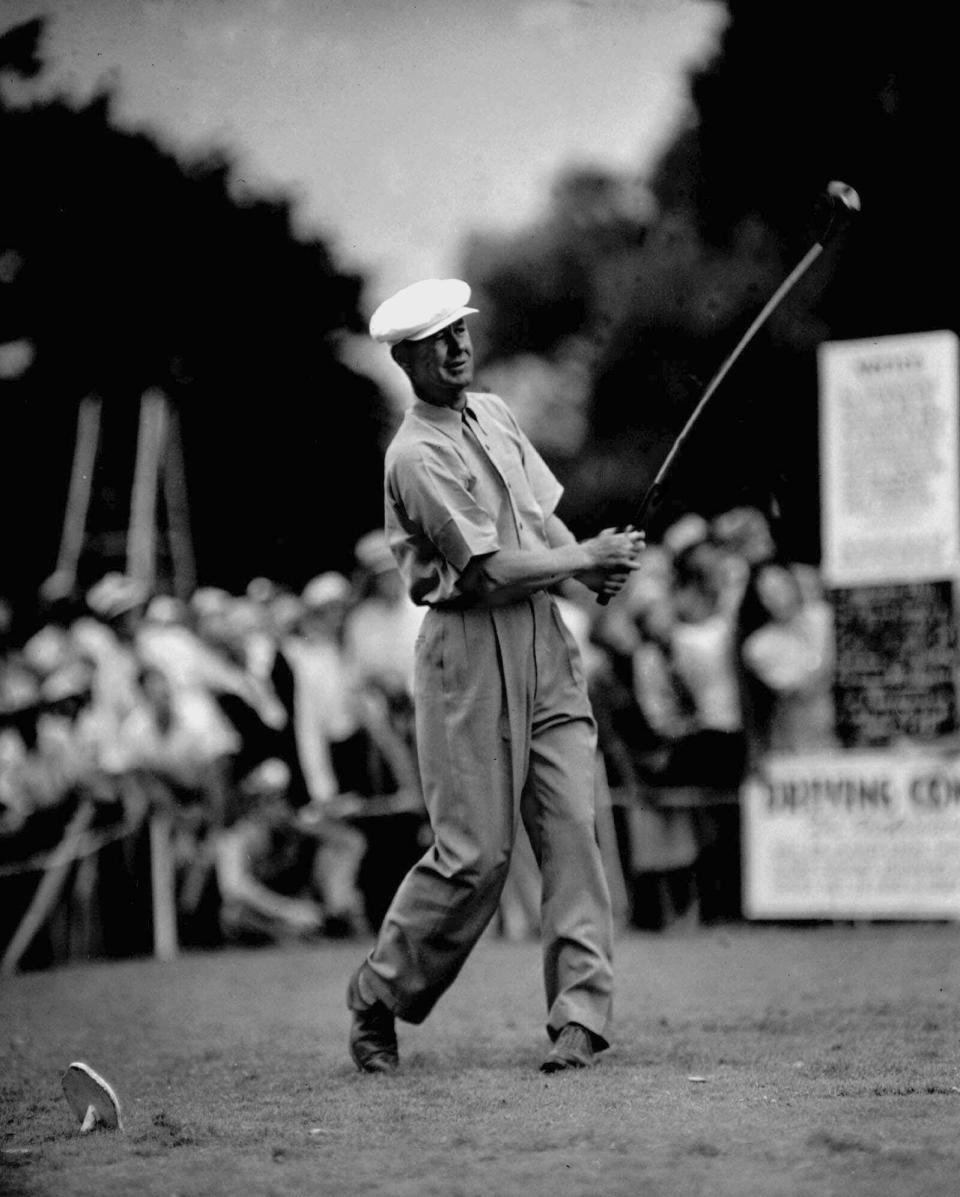Legendary golfer Byron Nelson made his name and fortune in Bergen County
- Oops!Something went wrong.Please try again later.
- Oops!Something went wrong.Please try again later.
By the time Fort Worth native Byron Nelson was 34 years old, he had earned enough money to buy a cattle ranch. He made his fortune, though, not in Texas, but up north in Paramus, where, while serving as golf pro at Ridgewood Country Club, he won some of the most prestigious golf tournaments of the 1930s and '40s.
Born in 1912, the same year as golf greats Ben Hogan and Sam Snead, Nelson survived a near-fatal bout of typhoid at age 11 and started caddying at age 12. A few years later, he beat Hogan in his club's caddie competition. Nelson, always a step ahead of Hogan, never looked back.
Nelson was a 23-year-old, sandy-haired golfer on the rise and a pro of three years when Professional Golfers' Association President George Jacobus announced he was bringing Nelson with him to New Jersey. Jacobus, also the head professional at Ridgewood County Club in Paramus, had been looking for a "young pro with promise, and all the boys along the winter circuit nodded in Nelson's direction," The Record's H. Beverly Hart reported in August 1935. The young player had just wrapped up a ninth-place finish at that year's Masters tournament.

Learning while teaching
Nelson did far more than give lessons to the region's elite while at Ridgewood Country Club. He learned how to manage a pro shop and run a tournament. He also honed his skills and dared to dream.
Nelson doubled his $400 club salary for the 1935 season by winning the New Jersey State Open at Monmouth County Country Club, also in August. It was his first PGA Tour event win. The next month, he watched Walter Hagen captain the U.S. Ryder Cup team to a 9-3 win over Great Britain at Ridgewood, and vowed to make the team himself one day.
The lessons Nelson learned on Ridgewood's east, west and center nines proved decisive. Jacobus, an advocate for youth golf who left behind a professional career to focus on instruction at the Ridgewood club, helped Nelson make the transition from hickory- to steel-shafted clubs and to fix flaws in his game. The tweaks were the last Nelson would ever need.

After he turned 24, Nelson resisted the temptation to change the swing he learned at Ridgewood. He was so averse to altering his game that he avoided experimentation on the driving range and rarely practiced. "I would just play the golf course," he said in 2003. "If I didn't know the course, I'd play it once to become acquainted with it. In those days we didn't do all the exercises the boys do now. Nobody exercised or stretched at all. I never heard of anybody exercising other than just playing golf."
Nelson earned his second tour victory in May 1936 at Quaker Ridge in Scarsdale, New York. The Record's editorial staff crowed about the local pro's performance in capturing the Metropolitan Open, one of the most prestigious tournaments of the day, from "as fine a field as ever competed for that title."
Nelson wasn't long for New Jersey, however. His return in 1936 was unexpected, as the club was moving away from retaining playing pros, for business reasons. It had more to do with working with Jacobus than working for the club. Moreover, the U.S. Open that year was at Baltusrol Golf Club in Springfield. At the end of the season, he left Paramus for Reading Country Club in Pennsylvania.
In April 1937, Nelson became the youngest player to win the prestigious Masters tournament in Augusta, Georgia. Two months later, he secured a point in the U.S. Ryder Cup team's 8-4 win.
Second only to Tiger Woods
By the time Hogan won his first major tournament in August 1946, Nelson had checked every box on his to-do list. A blood clotting condition kept him from joining Hogan and others in the U.S. war effort against the Axis powers. It was then that he cemented his legacy.
Of Nelson's 52 tour wins, 18 came in 1945, when he racked up a record 11 consecutive first-place finishes amid a run of 113 straight top-20 finishes. Only Tiger Woods has surpassed Nelson's run of 113 consecutive cuts made. No one has sniffed his top-20 or win streaks.
More: NY Giants training camp countdown: Ranking their Top 12 most impactful players for 2023
More importantly to Nelson, he won every important American tournament — ending with the Los Angeles Open, now called the Genesis Invitational, at Riviera Country Club in January 1946 — before retiring from full-time competition at the end of the 1946 season. Remarkably, he tacked on another win at the 1951 Bing Crosby Pro-Am.
"I was raised in Texas, and I wanted a ranch," Nelson told Golf Magazine's Peter Kessler in 2003. "That's what I wanted, and that's what I got." After retreating to his Roanoke, Texas, ranch at age 34, Nelson mentored younger golfers, such as fellow World Golf Hall of Fame members Tom Watson and Ken Venturi. He also worked as a golf commentator and ambassador who lent his name to the Dallas Open in 1968 in a first for the game. It's now called the AT&T Byron Nelson.
This article originally appeared on NorthJersey.com: Legendary golfer Byron Nelson made his name and fortune in Bergen

